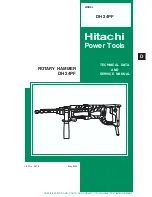
15 ENGLISH
Dust extractor attachment (for
hammering only)
Optional accessory
1.
Install the hose holder (A/B).
When the side handle is installed to tool, loosen the
clamp nut, and then remove the hex bolt. Install the
hose holder (A) between the hex bolt and the clamp nut
by tightening the clamp nut firmly.
►
Fig.22:
1.
Hex bolt
2.
Hose holder (A)
3.
Clamp nut
When the side grip is installed to the tool, loosen the
side grip, mount the hose holder (B) to the shaft, and
then tighten the side grip firmly.
►
Fig.23:
1.
Hose holder (B)
2.
Shaft
3.
Side grip
2.
Attach the holder joint to the tool, and then attach
the hose holder (C) to the holder joint.
►
Fig.24:
1.
Holder joint
2.
Hose holder (C)
NOTE:
The hose joint can be attached to either side
of the tool.
WARNING:
Use the mounting part of the tool
only for attaching the holder joint.
Using the mounting part for any other purpose may
cause an unexpected accident.
3.
Attach the dust cover and the hose to the tool, and
then fix the hose to the hose holders.
►
Fig.25:
1.
Dust cover
2.
Hose
3.
Hose holder (A/B)
4.
Hose holder (C)
4.
Connect the hose to the hose of the vacuum
cleaner with the hose joint.
NOTE:
If the hose is not included, attach the dust
cover to the cleaner's hose or attach it to Makita's
hose ø28.
5.
Adjust the distance between the dust cover and
the tip of the chisel or bull point. The recommended
distance is 30 mm to 100 mm.
►
Fig.26:
(1)
30 mm to 100 mm
OPERATION
CAUTION:
Always use the side handle / side
grip (auxiliary handle) and firmly hold the tool by
both side handle / side grip and switch handle
during operations.
CAUTION:
Always make sure that the work-
piece is secured before operation.
Failure to prop-
erly secure the workpiece may cause the workpiece
to move resulting in injury.
CAUTION:
Do not pull the tool out forcibly
even the bit gets stuck. Loss of control may
cause injury.
CAUTION:
Do not leave the tool stabbed in
the workpiece.
Otherwise the tool may starts unin
-
tentionally and cause an injury.
NOTE:
If the battery cartridge is in low temperature,
the tool’s capability may not be fully obtained. In this
case, warm up the battery cartridge by using the
tool with no load for a while to fully obtain the tool’s
capability.
►
Fig.27
Hammer drilling operation
CAUTION:
There is tremendous and sudden
twisting force exerted on the tool/drill bit at the time of
hole break-through, when the hole becomes clogged
with chips and particles, or when striking reinforcing
rods embedded in the concrete.
Always use the side
grip (auxiliary handle) and firmly hold the tool by
both side grip and switch handle during opera-
tions.
Failure to do so may result in the loss of control
of the tool and potentially severe injury.
Set the action mode changing knob to the
symbol.
Position the drill bit at the desired location for the hole,
then pull the switch trigger. Do not force the tool. Light
pressure gives best results. Keep the tool in position
and prevent it from slipping away from the hole.
Do not apply more pressure when the hole becomes
clogged with chips or particles. Instead, run the tool at
an idle, then remove the drill bit partially from the hole.
By repeating this several times, the hole will be cleaned
out and normal drilling may be resumed.
NOTE:
Eccentricity in the drill bit rotation may occur
while operating the tool with no load. The tool auto-
matically centers itself during operation. This does not
affect the drilling precision.
Chipping/Scaling/Demolition
Set the action mode changing knob to the
symbol.
Hold the tool firmly with both hands. Turn the tool on
and apply slight pressure on the tool so that the tool will
not bounce around, uncontrolled.
Pressing very hard on the tool will not increase the
efficiency.
►
Fig.28
Blow-out bulb
Optional accessory
After drilling the hole, use the blow-out bulb to clean the
dust out of the hole.
►
Fig.29
Summary of Contents for HR006G
Page 2: ...2 3 1 1 Fig 1 1 2 Fig 2 2 1 A B Fig 3 1 Fig 4 1 Fig 5 1 2 Fig 6 1 2 Fig 7 2 ...
Page 3: ...Fig 8 1 2 Fig 9 1 Fig 10 1 2 Fig 11 1 Fig 12 1 2 Fig 13 1 2 Fig 14 3 ...
Page 4: ...1 2 Fig 15 1 2 Fig 16 1 2 3 Fig 17 1 2 3 4 Fig 18 1 2 Fig 19 1 Fig 20 4 ...
Page 5: ...1 Fig 21 1 2 3 Fig 22 1 2 3 Fig 23 1 2 Fig 24 1 2 3 4 Fig 25 1 Fig 26 5 ...
Page 6: ...Fig 27 Fig 28 Fig 29 Fig 30 1 Fig 31 4 2 1 3 Fig 32 1 2 3 Fig 33 6 ...
Page 7: ...1 Fig 34 1 2 1 2 Fig 35 Fig 36 1 Fig 37 1 2 Fig 38 1 Fig 39 7 ...
Page 8: ...1 Fig 40 1 2 1 2 Fig 41 8 ...
Page 130: ...130 ...
Page 131: ...131 ...











































